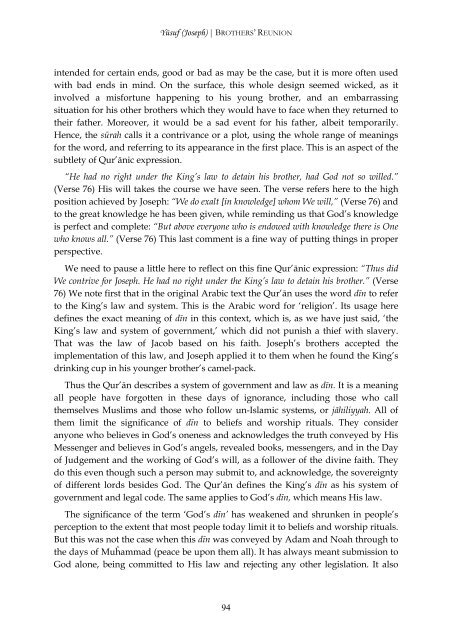Volume 10 Surah 12 - 15 - Enjoy Islam
Volume 10 Surah 12 - 15 - Enjoy Islam
Volume 10 Surah 12 - 15 - Enjoy Islam
You also want an ePaper? Increase the reach of your titles
YUMPU automatically turns print PDFs into web optimized ePapers that Google loves.
Yūsuf (Joseph) | BROTHERS’ REUNION<br />
intended for certain ends, good or bad as may be the case, but it is more often used<br />
with bad ends in mind. On the surface, this whole design seemed wicked, as it<br />
involved a misfortune happening to his young brother, and an embarrassing<br />
situation for his other brothers which they would have to face when they returned to<br />
their father. Moreover, it would be a sad event for his father, albeit temporarily.<br />
Hence, the sūrah calls it a contrivance or a plot, using the whole range of meanings<br />
for the word, and referring to its appearance in the first place. This is an aspect of the<br />
subtlety of Qur’ānic expression.<br />
“He had no right under the King’s law to detain his brother, had God not so willed.”<br />
(Verse 76) His will takes the course we have seen. The verse refers here to the high<br />
position achieved by Joseph: “We do exalt [in knowledge] whom We will,” (Verse 76) and<br />
to the great knowledge he has been given, while reminding us that God’s knowledge<br />
is perfect and complete: “But above everyone who is endowed with knowledge there is One<br />
who knows all.” (Verse 76) This last comment is a fine way of putting things in proper<br />
perspective.<br />
We need to pause a little here to reflect on this fine Qur’ānic expression: “Thus did<br />
We contrive for Joseph. He had no right under the King’s law to detain his brother.” (Verse<br />
76) We note first that in the original Arabic text the Qur’ān uses the word dīn to refer<br />
to the King’s law and system. This is the Arabic word for ‘religion’. Its usage here<br />
defines the exact meaning of dīn in this context, which is, as we have just said, ‘the<br />
King’s law and system of government,’ which did not punish a thief with slavery.<br />
That was the law of Jacob based on his faith. Joseph’s brothers accepted the<br />
implementation of this law, and Joseph applied it to them when he found the King’s<br />
drinking cup in his younger brother’s camel-pack.<br />
Thus the Qur’ān describes a system of government and law as dīn. It is a meaning<br />
all people have forgotten in these days of ignorance, including those who call<br />
themselves Muslims and those who follow un-<strong>Islam</strong>ic systems, or jāhiliyyah. All of<br />
them limit the significance of dīn to beliefs and worship rituals. They consider<br />
anyone who believes in God’s oneness and acknowledges the truth conveyed by His<br />
Messenger and believes in God’s angels, revealed books, messengers, and in the Day<br />
of Judgement and the working of God’s will, as a follower of the divine faith. They<br />
do this even though such a person may submit to, and acknowledge, the sovereignty<br />
of different lords besides God. The Qur’ān defines the King’s dīn as his system of<br />
government and legal code. The same applies to God’s dīn, which means His law.<br />
The significance of the term ‘God’s dīn’ has weakened and shrunken in people’s<br />
perception to the extent that most people today limit it to beliefs and worship rituals.<br />
But this was not the case when this dīn was conveyed by Adam and Noah through to<br />
the days of Muĥammad (peace be upon them all). It has always meant submission to<br />
God alone, being committed to His law and rejecting any other legislation. It also<br />
94

















